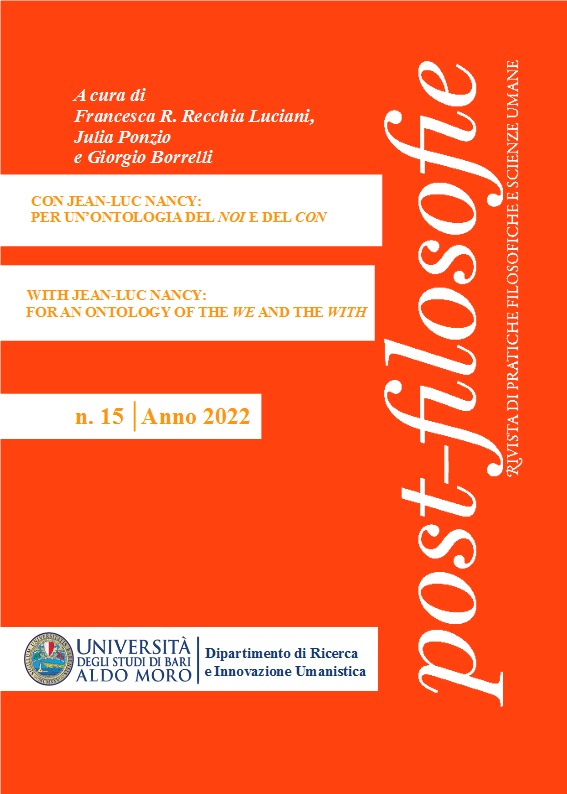Résister à la chute de l’Occident. Penser l’orientalisme anorexique avec Jean-Luc Nancy
DOI:
https://doi.org/10.15162/1827-5133/1832Parole chiave:
Corpo anoressico, Incarnazione, Incorporazione, Jean-Luc Nancy, Occidente, Anorexic Body, Incarnation, Incorporation, West, Corps anorexique, OccidentAbstract
Questo articolo propone di comprendere l’emergenza ed il senso del corpo anoressico a partire dal pensiero del corpo in Jean-Luc Nancy. Dopo l’articolazione di una prima distinzione tra i termini di “incarnazione” (Merleau-Ponty), “incorporazione” (Abraham e Torok) e “ex-corpore” (Nancy), si tratta di leggere il corpo anoressico attraverso i principali testi di Nancy sul corpo: Noli me tangere, Corpus, e sulla nascita del corpo come nascita del soggetto in Ego sum. Il concetto nancyano di “expropriation du corps” appare come centrale. Infine, attraverso un breve riferimento al testo La création du monde ou la mondialisation, si vuole situare la tragicità del corpo anoressico come forma di resistenza al disastro della riproduzione in serie dei corpi ed alla manipolazione del desiderio nella società occidentale capitalistica e consumeristica.
This article proposes to understand the emergence and sense of the anorexic body through Jean-Luc Nancy's thought on the body. After the articulation of an initial distinction between the terms “incarnation” (Merleau-Ponty), “incorporation” (Abraham and Torok) and “ex-corpore” (Nancy), we read the anorexic body through Nancy's main texts on the body: Noli me tangere, Corpus, and on the birth of the body as the birth of the subject in Ego sum. Nancy’s concept of “expropriation du corps” appears as central. Finally, by means of a brief reference to the text La création du monde ou la mondialisation, we wish to situate the tragic nature of the anorexic body as a form of resistance to the disaster of the mass reproduction of bodies and the manipulation of desire in capitalist and consumerist western society.
Riferimenti bibliografici
ABRAHAM N. et M. TOROK, L’écorce et le noyau, Champ-Flammarions, Paris 1987.
BAUDELAIRE C., Les fleurs du mal, Librio, Paris 2002.
LACAN J., Les complexes familiaux dans la formation de l’individu, Navarin, Paris 1984.
LEVINAS, E., De L’évasion, Fata Morgana, Paris 1982.
―, Totalité et infini. Essai sur l’extériorité, Le livre de poche, Paris 1990.
MERLEAU-PONTY M., Le visible et l’invisible, Éditions Gallimard, Paris 1964.
NANCY J.-L., Ego Sum, Flammarion, Paris 1979.
―, La création du monde ou la mondialisation, Éditions Galilée, Paris 2002.
―, Noli Me Tangere, Bayard Éditions, Paris 2003.
―, Corpus, Éditions Métailié, Paris 2006.
―, L’intrus, Éditions Galilée, Paris 2010.
RECALCATI M., L’anorexie comme suicide différé, dans «La clinique lacanienne» 2011/2 (n° 20), pp. 59-74.
RICHIR M., Le sens de la phénoménologie dans “Le visible et l’invisibleˮ, dans Maurice Merleau-Ponty, «Esprit», juin 1982.
Downloads
Pubblicato
Fascicolo
Sezione
Licenza
“Post-Filosofie” utilizza Open Journal Systems 2.4.8.5, che è un software open source per la gestione e la pubblicazione di riviste sviluppato, supportato e distribuito gratuitamente dal Public Knowledge Project sotto la GNU General Public License.
Gli autori che pubblicano su questa rivista accettano le seguenti condizioni:
- Gli autori mantengono i diritti sulla loro opera e cedono alla rivista il diritto di prima pubblicazione dell'opera, contemporaneamente licenziata sotto una Licenza Creative Commons - Attribuzione che permette ad altri di condividere l'opera indicando la paternità intellettuale e la prima pubblicazione su questa rivista.
- Gli autori possono aderire ad altri accordi di licenza non esclusiva per la distribuzione della versione dell'opera pubblicata (es. depositarla in un archivio istituzionale o pubblicarla in una monografia), a patto di indicare che la prima pubblicazione è avvenuta su questa rivista.
- Gli autori possono diffondere la loro opera online (es. in repository istituzionali o nel loro sito web) prima e durante il processo di submission, poichè può portare a scambi produttivi e aumentare le citazioni dell'opera pubblicata (Vedi The Effect of Open Access).
"Post-Filosofie" uses Open Journal Systems 2.4.8.5, which is an open source journal management and publication software developed, supported and distributed free of charge by the Public Knowledge Project under the GNU General Public License.
Authors publishing in this journal accept the following conditions:
- Authors retain the rights to their work and assign to the journal the right of first publication of the work, simultaneously licensed under a Creative Commons Licence - Attribution that allows others to share the work indicating intellectual authorship and first publication in this journal.
- Authors may enter into other non-exclusive licensing agreements to distribute the published version of the work (e.g., deposit it in an institutional repository or publish it in a monograph), as long as they indicate that the first publication was in this journal.
- Authors may disseminate their work online (e.g. in institutional repositories or on their website) before and during the submission process, as it may lead to productive exchanges and increase citations of the published work (See The Effect of Open Access).







